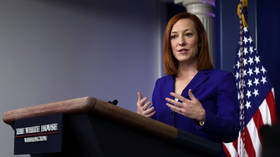White House explains why it's sending troops to Europe

The White House has doubled down on a decision to deploy a significant number of troops to bases across Central and Eastern Europe amid a tense standoff on the Russian-Ukrainian border, arguing the move is intended to calm its partners on the continent.
Speaking in a briefing on Wednesday, President Joe Biden’s spokesperson Jen Psaki commented on the movement of 2,000 soldiers from Fort Bragg in North Carolina to Germany and Poland, noting that they will supplement the “existing US force presence” in the two countries.
“These forces are separate and in addition to the 8,500 personnel in the United States on heightened alert position — posture that we announced last week,” she explained, adding that “if Russia stays on an escalatory path, which they clearly have, we will make force posture adjustments to deter and defend against any aggression.”
Psaki, however, clarified that these troops will not go into Ukraine and are not “fighting” there. “This is the US abiding by our commitments…to support, reassure our partners in the region,” she insisted.
Earlier on Wednesday, Pentagon spokesman John Kirby confirmed plans for the troop shuffle, which will see 2,000 servicemen sent to Poland and Germany this week. Another 1,000 stationed in Germany will be deployed to Romania.
Washington’s decision to bolster its presence in Europe, however, has come under fire from Moscow. Russia’s Deputy Foreign Minister Alexander Grushko called it a “destructive step” that would only “delight” Kiev’s officials, as well as “increase military tension and reduce the margin for political solutions.”
Western leaders have expressed concern for months that Moscow could be planning an invasion of Ukraine. The Kremlin has repeatedly denied that it has any aggressive intentions, and has instead demanded security deals that would limit the expansion of NATO closer to its borders, which has been described as a question of “life or death” by its press secretary, Dmitry Peskov.












